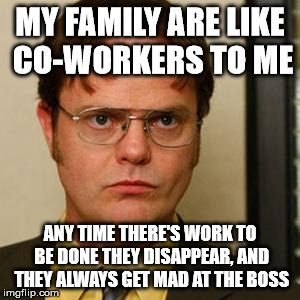
I understand that this is one of those simple things and seems so insignificant that it shouldn't really matter right? In a talk by Elder Joe J. Christensen, he gives several pointers to help with our marriages:
1. Remember the central importance of your marriage. Listen to these words from Elder Bruce R. McConkie on the importance of marriage in our Father in Heaven’s “great plan of happiness” (Alma 42:8):
“From the moment of birth into mortality to the time we are married in the temple, everything we have in the whole gospel system is to prepare and qualify us to enter that holy order of matrimony which makes us husband and wife in this life and in the world to come. …
“There is nothing in this world as important as the creation and perfection of family units” (“Salvation Is a Family Affair,” Improvement Era, June 1970, pp. 43–44).
2. Pray for the success of your marriage. In order to recognize our personal problems or weaknesses which hinder us from being better marriage partners, we should come to the Lord in prayer and reap the benefits of this powerful Book of Mormon promise: “If men come unto me I will show unto them their weakness…; for if they humble themselves before me, and have faith in me, then will I make weak things become strong unto them” (Ether 12:27).
And so the need to pray. Many Church leaders and marriage counselors indicate that they have not seen one marriage in serious trouble where the couple was still praying together daily. When problems arise and marriages are threatened, praying together as a couple may be the most important remedy.
3. Listen. Make the time to listen to your spouse; even schedule it regularly. Visit with each other and assess how you are doing as a marriage partner.
Brother Brent Barlow posed a question to a group of priesthood brethren: “How many of you would like to receive a revelation?” Every hand went up. He then suggested that they all go home and ask their wives how they could be better husbands. He added, “I followed my own advice, and had a very informative discussion with [my wife] Susan for more than an hour that afternoon!” (Ensign, Sept. 1992, p. 17). A conversation like that could be a revelation for any of us.
Have any of you brethren ever had your wife say something like I heard recently: “Joe, are you listening?” She wasn’t the only one who wondered if I was listening. Some time ago, I was taking a nap and our little granddaughter Allison came and lifted up one of my eyelids and said, “Grandpa, are you in there?” We should be “in there” and responsive to our mate.
4. Avoid “ceaseless pinpricking.” Don’t be too critical of each other’s faults. Recognize that none of us is perfect. We all have a long way to go to become as Christlike as our leaders have urged us to become.
“Ceaseless pinpricking” (as President Kimball called it), can deflate almost any marriage (“Marriage and Divorce,” Brigham Young University 1976 Speeches of the Year, Provo, Utah: University Publications, 1977, p. 148). Generally, each of us is painfully aware of our weaknesses, and we don’t need frequent reminders. Few people have ever changed for the better as a result of constant criticism or nagging. If we are not careful, some of what we offer as constructive criticism is actually destructive.
5. Keep your courtship alive. Make time to do things together—just the two of you. As important as it is to be with the children as a family, you need regular weekly time alone together. Scheduling it will let your children know that you feel that your marriage is so important that you need to nurture it. That takes commitment, planning, and scheduling.
It doesn’t need to be costly. The time together is the most important element.
6. Be quick to say, “I’m sorry.” As hard as it is to form the words, be swift to say, “I apologize, and please forgive me,” even though you are not the one who is totally at fault. True love is developed by those who are willing to readily admit personal mistakes and offenses.
When differences do arise, being able to discuss and resolve them is important, but there are instances when it is best to take a time-out. Biting your tongue and counting to ten or even a hundred is important. And occasionally, even letting the sun go down on your wrath can help bring you back to the problem in the morning more rested, calm, and with a better chance for resolution.
7. Learn to live within your means. Some of the most difficult challenges in marriage arise in the area of finances. “The American Bar Association … indicated that 89 percent of all divorces could be traced to quarrels and accusations over money” (Ensign, July 1975, p. 72). Be willing to postpone or forgo some purchases in order to stay within your budget. Pay your tithing first, and avoid debt insofar as possible. Remember that spending fifty dollars a month less than you receive equals happiness and spending fifty more equals misery. The time may have come to get out the scissors and your credit cards and perform what Elder Holland called some “plastic surgery” (Ensign, June 1986, p. 30).
8. Be a true partner in home and family responsibilities. Don’t be like the husband who sits around home expecting to be waited on, feeling that earning the living is his chore and that his wife alone is responsible for the house and taking care of the children. The task of caring for home and family is more than one person’s responsibility. Remember that you are in this partnership together. Find time to study the scriptures together, and follow this sound counsel from President Kimball: “When a husband and wife go together frequently to the holy temple, kneel in prayer together in their home with their family, go hand in hand to their religious meetings, keep their lives wholly chaste, mentally and physically, … and both are working together for the upbuilding of the kingdom of God, then happiness is at its pinnacle” (Marriage and Divorce, Salt Lake City: Deseret Book Co., 1976, p. 24).
Source: https://www.lds.org/general-conference/1995/04/marriage-and-the-great-plan-of-happiness?lang=eng
Follow these steps and your marriage will continue to bloom and grow. Even if you've been married for years, you will still find out new things about your significant other. I understand that not every relationship is perfect, but you can always work on bettering your relationship all the time.





